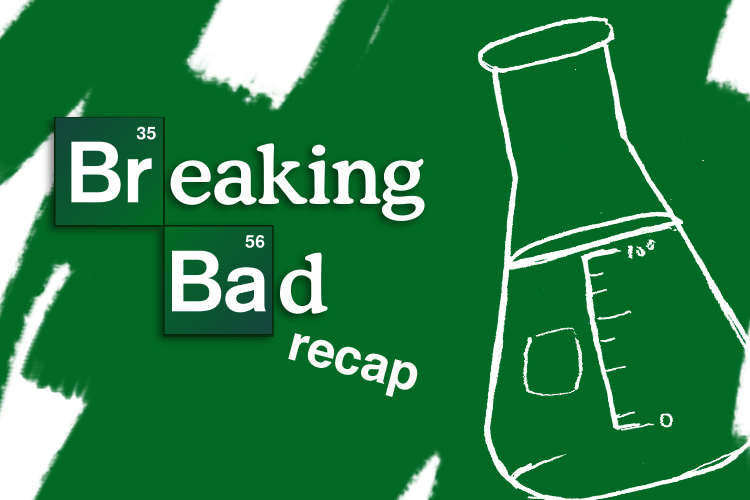[NOTE: This recap contains SPOILERS for “Breaking Bad” Season 5, Episode 7; proceed at your own risk.]
Jesse might not just have been shocked and depressed by his first killing; he might have become desensitized, too.
That’s what I took away from the opening of last night’s “Breaking Bad,” which showed Walt’s former right-hand man blasting away at a video game and flashing back to the head shot that killed Gale Boetticher, Walt’s would-be replacement as chief chemist, last season.
The end of the scene pointed the way toward Jesse and Walt’s subplot during that episode; Jesse had a choice to end the game or restart, and he chose to keep playing. Walt pressured Jesse to kill Gus with poison, and Jesse said yes, hiding the substance inside a cigarette pack and then waiting for an opportune moment. History was repeating itself; this was the second time that Walt decided he needed somebody killed and leaned on Jesse to make it happen. Teasers from next week’s episode showed Walt tightening the screws on Jesse to get the job done fast — a natural outgrowth of the episode’s final scene, which showed Hank dazzling his once-skeptical DEA colleagues with a convincing case that Heisenberg was still alive and that his boss was Gustavo Fring, who was using his chicken restaurants as a front for meth distribution and throwing authorities off the scent by posing as a friend of law enforcement. (“Keep your friends close and your enemies closer,” Hank said — the second time that “Godfather” line has been quoted in the past two weeks.)
I wasn’t convinced that Jesse would have agreed to Walt’s request so quickly, however. Yes, the dramatic architecture was in place; Jesse’s arc on “Breaking Bad” has been more like a downward moral spiral, taking him from the fringes of the drug trade into its violent heart. Yes, he’s a killer now, and seemingly much more tormented about it than Walt is by his own bloody track record. (To Jesse, murder is a physical act; to Walt, it’s a tactic.) But the writing here felt too expedient — too much like a belated attempt to tie up what I call the “aftermath” narrative of Season 4, and push the characters ahead to the next phase of their existence, whatever that turns out to be. I didn’t buy that Jesse would have agreed so quickly to kill Gus. It seemed like a vestige of his relationship with Walt back in Season 2, when Jesse was still devastated by his girlfriend’s death and had not yet been pushed to murder.
In fairness, the episode seemed to have its doubts, too. Jesse almost immediately got a chance to kill Gus, but he didn’t take it because he was interested to find out what Gus saw in him, and then he lied about it to Walt later on. I’m very intrigued to see where this subplot is headed. Even though the episode did a poor job of selling Jesse’s reflexive “yes” to Walt’s murder request, it set up the tantalizing possibility that he got involved in the plot because of his past associations with Walt, not because his heart was really in it. If you judge Jesse’s psychological state based solely on what he’s saying and doing — how he carries himself on-screen, how actor Aaron Paul delivers the character’s lines — he seems disconnected from Walt, and emotionally much closer to Mike, who’s turning into his new surrogate dad.
The show seems to be arranging its subplots so that they dovetail with a terrifying loyalty test for Jesse, one that forces him to choose between Walt and Gus (and Gus’ organization). The rules of TV storytelling would seem to favor Walt because he’s the main character, and because until Season 4, he and Jesse were a package deal, the Pinky and the Brain of the New Mexico drug trade.
But Walt has been such a horrible, manipulative Bad Daddy for so long that any affection Jesse still feels for him must be a result of conditioning more than authentic emotion. And unlike Walt, he still has the remains of a conscience; that’s why he hallucinated seeing Gale’s face in the opening, and it’s why he broke down during the AA meeting and delivered a coded anecdote about killing a “Problem Dog” (the phrase that gave this episode its title). As I’ve written previously, deep down, Walt wants to get caught; the aerial shot of the tire tracks left by all those parking-lot donuts are a metaphor for the obvious trails he’s leaving everywhere in his criminal life. I think the same is true for Jesse. But there’s a key difference. Walt’s desire to get caught is a matter of vanity, so that the world will know how special he is. Jesse’s urge is different. He wants to be punished.
Once the DEA investigation starts pitting the criminal characters against each other and pushing them to make extreme choices, the show’s nagging plausibility problems can only become more pronounced: Jesse and Skyler’s increasingly absurd efforts to launder millions in drug money through one car wash; the question of how the supposedly super-observant Gus overlooked the fact that Walt has a DEA agent brother-in-law to begin with; and why Gus would be so dumb as to intertwine a meth business with his legitimate restaurant chain and even store the product inside buckets of Los Pollos Hermanos deep-fry batter.
But all this will seem inconsequential if the show stays true to Jesse as he’s been written so far, and keeps giving Aaron Paul moments as powerful as the one in the AA meeting. Walt may be the brains of “Breaking Bad,” but Jesse is its heart.

